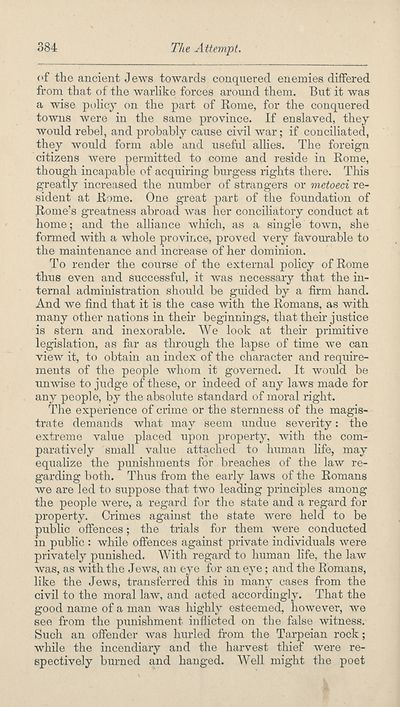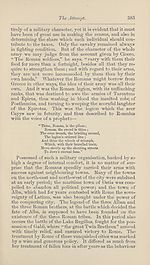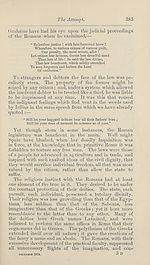Download files
Complete book:
Individual page:
Thumbnail gallery: Grid view | List view

384 The Attempt.
of the ancient Jews towards conquered enemies differed
from that of the warhke forces around them. But it was
a wise policy on the part of Rome, for the conquered
towns were in the same province. If enslaved, they
would rebel, and probably cause civil war; if conciliated,
they would form able and useful allies. The foreign
citizens were permitted to come and reside in Rome,
though incapable of acquiring burgess rights there. This
greatly increased the number of strangers or metoeci re¬
sident at Rome. One great part of the foundation of
Rome's greatness abroad Avas her conciliatory conduct at
home; and the alliance which, as a single town, she
formed with a whole province, proved very favourable to
the maintenance and increase of her dominion.
To render the course of the external policy of Rome
thus even and successful, it was necessary that the in¬
ternal administration should be guided by a firm hand.
And we find that it is the case with the Romans, as with
many other nations in their beginnings, that their justice
is stern and inexorable. We look at their primitive
legislation, as far as through the lapse of time we can
view it, to obtain an index of the character and require¬
ments of the people whom it governed. It would be
unwnse to judge of these, or indeed of any laws made for
any people, by the absolute standard of moral right.
The experience of crime or the sternness of the magis¬
trate demands what may seem undue severity: the
extreme value placed upon property, with the com¬
paratively small value attached to human life, may
equalize the punishments for breaches of the law re¬
garding both. Thus from the early laws of the Romans
we are led to suppose that two leading principles among
the people were, a regard for the state and a regard for
property. Crimes against the state were held to be
public offences; the trials for them were conducted
in public : while oflf'ences against private individuals were
privately jjunished. With regard to human life, the law
was, as with the Jews, an eye for an eye; and the Romans,
like the Jews, transferred this in many cases from the
civil to the moral law, and acted accordingly. That the
good name of a man was highly esteemed, however, we
see from the punishment inflicted on the false witness.
Such an offender was hurled from the Tarpeian rock ;
while the incendiary and the harvest thief were re¬
spectively burned and hanged. Well might the poet
of the ancient Jews towards conquered enemies differed
from that of the warhke forces around them. But it was
a wise policy on the part of Rome, for the conquered
towns were in the same province. If enslaved, they
would rebel, and probably cause civil war; if conciliated,
they would form able and useful allies. The foreign
citizens were permitted to come and reside in Rome,
though incapable of acquiring burgess rights there. This
greatly increased the number of strangers or metoeci re¬
sident at Rome. One great part of the foundation of
Rome's greatness abroad Avas her conciliatory conduct at
home; and the alliance which, as a single town, she
formed with a whole province, proved very favourable to
the maintenance and increase of her dominion.
To render the course of the external policy of Rome
thus even and successful, it was necessary that the in¬
ternal administration should be guided by a firm hand.
And we find that it is the case with the Romans, as with
many other nations in their beginnings, that their justice
is stern and inexorable. We look at their primitive
legislation, as far as through the lapse of time we can
view it, to obtain an index of the character and require¬
ments of the people whom it governed. It would be
unwnse to judge of these, or indeed of any laws made for
any people, by the absolute standard of moral right.
The experience of crime or the sternness of the magis¬
trate demands what may seem undue severity: the
extreme value placed upon property, with the com¬
paratively small value attached to human life, may
equalize the punishments for breaches of the law re¬
garding both. Thus from the early laws of the Romans
we are led to suppose that two leading principles among
the people were, a regard for the state and a regard for
property. Crimes against the state were held to be
public offences; the trials for them were conducted
in public : while oflf'ences against private individuals were
privately jjunished. With regard to human life, the law
was, as with the Jews, an eye for an eye; and the Romans,
like the Jews, transferred this in many cases from the
civil to the moral law, and acted accordingly. That the
good name of a man was highly esteemed, however, we
see from the punishment inflicted on the false witness.
Such an offender was hurled from the Tarpeian rock ;
while the incendiary and the harvest thief were re¬
spectively burned and hanged. Well might the poet
Set display mode to: Large image | Transcription
Images and transcriptions on this page, including medium image downloads, may be used under the Creative Commons Attribution 4.0 International Licence unless otherwise stated. ![]()
| Ladies' Edinburgh Debating Society publications > Attempt > Volume 10 > (396) Page 384 |
|---|
| Permanent URL | https://digital.nls.uk/104314598 |
|---|
| Attribution and copyright: |
|
|---|

